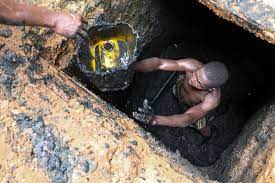
By Babatope Babalobi
Sanitation workers have been urged to organise themselves and unionise so that:
- their voices could be heard
- the values of their work could be dignified and respected, and
- to enable their capacity to be built by government and donor bodies.
This is the major outcome of a virtual side event of the United Nations 2023 Water Conference in New York today.
- ‘Government and individuals always find it difficult to identify where to find and locate sanitation workers. Sanitation workers should organise themselves to have a voice’ said Carlos Carrion of the International Labour Organisation.
The event, themed: SDG 6.2 – A Pipe Dream Without a Professional Sanitation Workforce raised awareness about well-being of sanitation workers, bring their voices to the forefront, and explore pathways to progress based on experiences from several countries.
Sustainable Development Goad 6.2 seeks to: By 2030, achieve access to adequate and equitable sanitation and hygiene for all and end open defecation, paying special attention to the needs of women and girls and those in vulnerable situations.
The meeting was organised by Indian Institute for Human Settlements, Pan-African Sanitation Actors, WaterAid, World Health Organisation, SNV Netherlands Development Organization, Sustainable Sanitation Alliance, International Labour Organization, World Bank, and UN-Habitat
Sanitation workers include toilet cleaners, sewer emptier, septic tanks and drains cleaners, latrine pit emptiers, and operators of sewage treatment plants. They may be employed by government institutions, private sector, or the informal economy. According to the event organisers:
‘Sanitation workers operate in a highly unregulated environment as a largely undocumented resource. Despite their massive contribution to SDG 6.2, they still work in hazardous environments. Conversations and efforts to improve their health, safety, dignity, employment security, and quality of life are rare’, said the organisers of the event.
‘The need and demand for sanitation services in Africa and South Asia outstrip current coverage due to rapid urbanisation and sluggish (or non-existent) investment in sanitation service provision. Currently, services for non-sewered sanitation are primarily provided by the private sector: Micro, Small and Medium Enterprises (MSMEs), Community-Based Organisations (CBOs) and Casual Sanitation Workers’
The panellists at today’s workshop emphasised the following:
- Occupational safety of sanitation workers should be addressed.
- National, sub national and local governments should develop policies, laws, and regulations to guide informal and formal sanitation labour.
- All citizens must be willing to listen to the views of Sanitation and amplify their voices.
- Private Protection Accessories should be given to sanitation workers.
- Sanitation workers should be insured because of the risks involved in their work.
- Sanitation workers should be made central to achieving SDG 6.2
Summarising the outcomes of the event, Carlos Carrion of the International Labour Organisation said:

- There is a need to mobilise visibility, recognition, and support for sanitation workers to combat the stigma that sanitation labourers face.
- Local Government Authorities should recognise and regulate the Sanitation work and workers.
- Sanitation workers should organise themselves to have a voice and show the value of the work and to ensure the capacity of workers and providers is built.
- International organisations can play a big role to assist sanitation workers build their capacity, and they should implement practical actions on this.
Leave a Reply